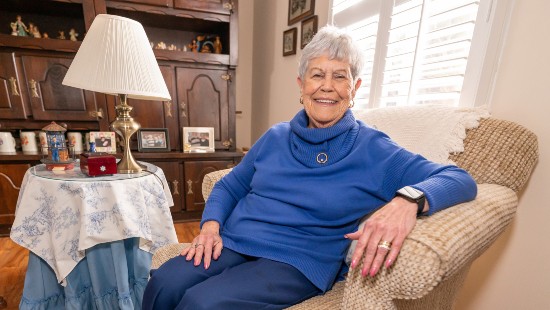COVID Leads to a Life-Saving Lung Cancer Diagnosis

When Gambrills resident Dolores Burden contracted COVID-19 in December 2020, she was surprised — and devastated — to also receive a lung cancer diagnosis. As a devoted grandmother and a retired nurse, she took her health seriously, staying up-to-date on vaccines and doctor appointments. When her COVID-19 pneumonia took a turn for the worse, she needed to be hospitalized at the University of Maryland Baltimore Washington Medical Center.
After a two-night stay at the hospital, Burden was well enough to go home, but she was met with another surprise during her hospitalization. A routine CT scan revealed a small lung nodule, or mass, in her left lung. The nodule lit up brightly on a follow-up PET scan, making it highly concerning for lung cancer.
So, Burden met with the pulmonary care team at UM Baltimore Washington Medical Group. She had pulmonary function testing done to determine if she had adequate lung function to undergo surgical removal of the lung nodule. She then underwent bronchoscopy with lymph node biopsies with Peter Olivieri, MD, pulmonologist at UM BWMC, to determine whether or not the suspected lung cancer had spread to her lymph nodes. Luckily, none of her lymph nodes were involved, which meant the suspected cancer was determined to be stage 1, making it easier to treat.
“When patients have a lung mass or suspected lung cancer, we often do a procedure called bronchoscopy. This allows us to obtain biopsies of the nodule, as well as the lymph nodes in the chest. Ideally, this facilitates the diagnosis and staging of lung cancer with one procedure,” said Dr. Olivieri.
Because of the difficult location of her nodule, Burden underwent another procedure, a CT-guided biopsy performed by an interventional radiologist, which confirmed the suspected diagnosis of lung cancer.
“Just a few months after I had COVID-19 and pneumonia, I was diagnosed with lung cancer,” Burden said. “The only good news was that we caught it early, thanks to my COVID-19 hospitalization.”
Importance of Early Detection of Lung Cancer
The Lung Screening Program at the Tate Cancer Center at UM Baltimore Washington Medical Center helps find lung cancer early, before symptoms develop.
“By the time lung cancer causes symptoms—coughing, wheezing, chest pain, coughing up blood and weight loss—it’s usually in a later stage, which carries a less favorable prognosis and is more challenging to treat,” Dr. Olivieri said. “If you catch it early at stage 1 or 2, surgery or radiation can potentially cure the cancer. Luckily this was true for Dolores.”
As a healthy 79-year-old with early-stage lung cancer, Burden was a great candidate for surgery. Dr. Olivieri referred her to thoracic surgeon Gavin Henry, MD, chair of thoracic surgery at UM BWMC.
“We completed a minimally-invasive resection on her lung, where we used robotic-assisted technology to make several tiny incisions to access the tumor from between the ribs,” Dr. Henry said. “We took out the portion of the lung with the tumor, providing the best shot at curing the cancer.”
After a few days in the hospital, Burden was well enough to continue her recovery at home. A few weeks later, she was taking minimal pain medications and working on regaining her strength and energy. Tests and imaging showed all of the cancer was successfully removed during surgery, and she wouldn’t need additional therapies like radiation or chemotherapy.
“Stage 1 lung cancer is the best situation because the earlier we diagnose it, the better chance we have at curing it with surgery,” Dr. Henry said. “That is why lung cancer screenings, like those we perform at the Tate Cancer Center at UM BWMC, are so important. While incidental findings like Dolores’s are great, our goal is to find screening candidates early so we can save as many lives as possible.”
Cancer and COVID-19 Survivor
A year and a half later, Burden continues her follow-up visits with UM Baltimore Washington Medical Group – Pulmonary Care. She remains cancer-free and is grateful to the care team. “The doctors at UM BWMC are excellent,” Burden said. “We are so fortunate to have these resources in our community. As a lung patient both in and out of the hospital, all my doctors are on the same campus and work together to make sure I receive great care.”
Vaccinated and boosted, Burden continues to be vigilant with protecting her and her family from COVID-19. Although the virus may be credited with discovering her cancer, she’s not taking any chances. Burden encourages everyone to “get the vaccine!”
This story was originally published in the Spring 2022 issue of Maryland’s Health Matters.
